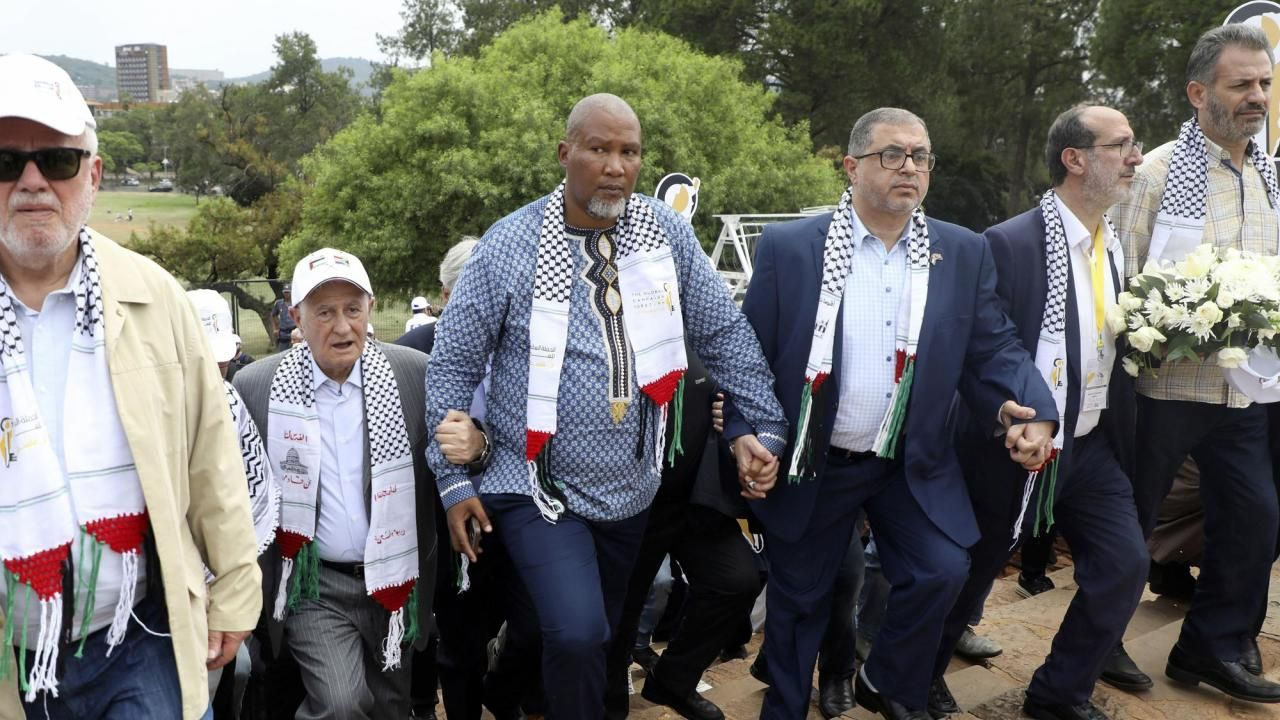The UK’s decision to deny a visa to Mandla Mandela over his support for Hamas stirs international debate on freedom of expression and security.
In a recent decision that has sparked debate, the UK government denied a visa to Mandla Mandela, the grandson of Nelson Mandela, citing his support for Hamas and statements related to the ongoing Israel-Hamas conflict.
Mandla Mandela, who serves as a South African Member of Parliament, was invited to speak at pro-Palestinian gatherings in Manchester, Edinburgh, and Glasgow. Although his South African government passport generally allows for visa-free entry into the UK, he was informed of an additional visa requirement.
Upon application, his request was rejected by the UK Home Office on grounds that his presence could endanger public safety and potentially inflame tensions among Jewish communities in the UK.
According to a letter dated October 21 from the UK Home Office, which Mandela received a few days later, the refusal was based on specific statements he made in support of Hamas, designated a terrorist organization by the UK.
Read : 7 NATO Members Including US and Germany Against Giving Membership to Ukraine
The letter references multiple social media posts by Mandela, where he openly endorsed Hamas and its leadership, including the late Ismail Haniyeh, a senior Hamas figure who was killed in an airstrike in July.
Additionally, the letter detailed Mandela’s attendance at Haniyeh’s funeral in August and his meetings with Khaled Meshaal, another prominent Hamas leader.
Read : Pakistan 4th, Nepal 7th, North Korea 8th: Check the Top Ten Weakest Passports in the World in 2024
The UK government stated that his expressions of support were seen as “unacceptable behavior” and emphasized that his visa application was denied to uphold public safety and order. By denying his entry, the UK government signaled its intent to prevent potential community discord, underscoring the tensions around pro-Palestinian activism and support for Hamas in international contexts.
Mandela’s Response: Echoes of a Legacy
Mandla Mandela responded strongly to the decision, asserting that the visa denial would not deter his support for Palestinian rights. He described his advocacy as part of a commitment to justice and equality, criticizing the UK’s stance as an attempt to curb his freedom of expression and right to international movement.
Mandela went as far as to compare the restrictions placed on him with those experienced by his grandfather, Nelson Mandela, during apartheid. Nelson Mandela was a globally recognized symbol of anti-apartheid struggle and human rights, spending 27 years in prison due to his fight against the racially oppressive system in South Africa.
For Mandla Mandela, the UK’s decision resonates as a restriction reminiscent of that legacy, as he views his own advocacy for Palestinians as a continuation of the human rights work for which his grandfather became iconic.
Mandla Mandela expressed his disappointment, pointing out that the refusal reflects ongoing support by the UK and other Western nations for Israeli policies, which he described as fostering “genocide and ethnic cleansing” in Gaza and Occupied Palestine.
Mandela’s viewpoint frames the visa denial not only as a personal restriction but as an action reflective of a broader policy stance that he, along with other pro-Palestinian advocates, perceives as a bias in favor of Israel over Palestinian rights.
In defending his support for Hamas, Mandela argued that it represents his solidarity with Palestinian self-determination, describing his position as a stand against what he views as the “unjust occupation” of Palestinian lands.
He stressed his commitment to continuing his public stance on the issue, undeterred by restrictions on his travel. The decision has garnered responses from various pro-Palestinian organizations, including the Desmond Tutu Foundation in South Africa and the Sheffield Palestine Coalition Against Israeli Apartheid, which have criticized the UK government for barring Mandela’s entry.
Broader Implications: Freedom of Expression and National Security
The UK’s decision to deny entry to Mandela highlights the complex intersection of national security, freedom of speech, and international diplomacy. As the grandson of a historic human rights figure, Mandela’s advocacy for Palestinians carries symbolic weight, especially given South Africa’s own history of colonialism and racial oppression.
For supporters, Mandela’s stance reflects a legacy of anti-colonial struggle; however, for the UK government, his vocal support for Hamas has been deemed a risk to public security and order.

The UK’s choice underscores a broader debate over the boundaries of acceptable expression, particularly concerning support for groups designated as terrorist organizations. The UK’s position aligns with similar visa policies enforced across other Western countries, where support for or association with designated terrorist organizations can preclude foreign nationals from entry.
However, pro-Palestinian advocates argue that the stance is indicative of a systemic bias against Palestinian voices in Western countries, especially as nations like the UK hold diplomatic ties and strategic interests in the Middle East.
The incident brings into question the global approach to freedom of expression concerning contentious political issues. For critics of the UK’s decision, the denial of entry to Mandela may represent an infringement on the right to advocate for political causes, particularly those opposing established geopolitical alliances.
On the other hand, proponents argue that the refusal to grant him a visa is a necessary measure to prevent potential unrest in the UK, where the Israel-Palestine conflict has polarized communities.
This debate extends to discussions of diplomatic relations, as Mandela’s family legacy holds significant influence in South Africa and beyond. Nelson Mandela’s strong stance against apartheid, which many parallels with Palestinian struggles, continues to inspire human rights activism worldwide.
Mandla Mandela’s outspoken support for Hamas may thus hold additional weight in global discussions on the Israel-Palestine issue, especially as nations grapple with balancing domestic security concerns with the universal right to political expression.

